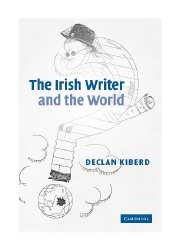Book contents
- Frontmatter
- Contents
- Acknowledgements
- A note on the text
- 1 Introduction
- 2 The fall of the Stage Irishman (1979)
- 3 Storytelling: the Gaelic tradition (1978)
- 4 Writers in quarantine? The case for Irish Studies (1979)
- 5 Synge, Yeats and bardic poetry (2002)
- 6 George Moore's Gaelic lawn party (1979)
- 7 The flowering tree: modern poetry in Irish (1989)
- 8 On national culture (2001)
- 9 White skins, black masks: Celticism and Négritude (1996)
- 10 From nationalism to liberation (1997)
- 11 The war against the past (1988)
- 12 The Elephant of Revolutionary Forgetfulness (1991)
- 13 Reinventing England (1999)
- 14 Museums and learning (2003)
- 15 Joyce's Ellmann, Ellmann's Joyce (1999)
- 16 Multiculturalism and artistic freedom: the strange death of Liberal Europe (1993)
- 17 The Celtic Tiger: a cultural history (2003)
- 18 The city in Irish culture (2002)
- 19 Strangers in their own country: multiculturalism in Ireland (2001)
- Index
- References
19 - Strangers in their own country: multiculturalism in Ireland (2001)
Published online by Cambridge University Press: 22 September 2009
- Frontmatter
- Contents
- Acknowledgements
- A note on the text
- 1 Introduction
- 2 The fall of the Stage Irishman (1979)
- 3 Storytelling: the Gaelic tradition (1978)
- 4 Writers in quarantine? The case for Irish Studies (1979)
- 5 Synge, Yeats and bardic poetry (2002)
- 6 George Moore's Gaelic lawn party (1979)
- 7 The flowering tree: modern poetry in Irish (1989)
- 8 On national culture (2001)
- 9 White skins, black masks: Celticism and Négritude (1996)
- 10 From nationalism to liberation (1997)
- 11 The war against the past (1988)
- 12 The Elephant of Revolutionary Forgetfulness (1991)
- 13 Reinventing England (1999)
- 14 Museums and learning (2003)
- 15 Joyce's Ellmann, Ellmann's Joyce (1999)
- 16 Multiculturalism and artistic freedom: the strange death of Liberal Europe (1993)
- 17 The Celtic Tiger: a cultural history (2003)
- 18 The city in Irish culture (2002)
- 19 Strangers in their own country: multiculturalism in Ireland (2001)
- Index
- References
Summary
The seductive charm of Irish culture no longer seems to work in quite the old way. A céad míle fáilte is not extended to all new arrivals any more. Yet the historical capacity of the Irish to assimilate waves of incomers should never be underestimated. Eight centuries ago, after all, the Normans became ‘more Irish than the Irish themselves’. Who is to say that the latest group of arriving Nigerians might not know the same destiny? If there is no zeal like the zeal of the convert, there may be no Irishness quite like that of the recent recruit.
The fear of being assimilated too readily to Irish culture haunted those colonisers who came in the armies of the English queen, Elizabeth I. Their official artists painted portraits of men who had gone native and been barbarised by contact with Gaelic culture. In them, hybridity, far from being a desirable state of cultural fusion, was seen as a negation of humanity itself, as two discrepant codes cancelled one another out, leaving the victim a prey to evil instinct and uncontrolled lasciviousness. On the other side, Gaelic poets lambasted those overlords who were keen to anglicise themselves, dubbing them half-breeds (‘a dhream gaoidhealta gallda’). Nobody wanted to be a hybrid in those far-off, pre-post-modern days: yet somehow quite a lot of writers (and, one assumes, ordinary persons) managed the trick.
- Type
- Chapter
- Information
- The Irish Writer and the World , pp. 303 - 320Publisher: Cambridge University PressPrint publication year: 2005
References
- 1
- Cited by



